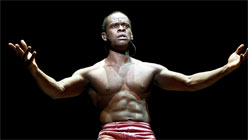The show was conceived, directed and choreographed by Bill T. Jones, who co-wrote the book with Jim Lewis. Sahr Ngaujah is quite stupendous as Fela. Although the stage is full of other dancers — men and women (the women also play his 27 wives), the show is essentially a one-man, 2 and 1/2 hour monologue and mega concert. It is Ngaujah’s charm, charisma and boundless energy that is truly the show’s be-all and end-all.
Yes, the dancers are talented and exciting. The harem of females is also often funny as the huffy, competitive and territorial wives. And the on-stage Brooklyn Afrobeat band is on fire. But it is Ngaujah as Fela who captivates.
Between tokes from his joint, (he warns the front row of a contact high) Fela tells us stories of his musical and political education and his innovative, artistic work as a populist activist. He brings us along to London and New York, where he picks up tips from the music of Frank Sinatra, Miles Davis and James Brown. New York is where — thanks to a woman he wants to bed — he reads Angela Davis and Malcolm X. “I had to go all the way to America to understand things my mother was trying to teach me all along,” he says.

Melanie Marshall and Sahr Ngaujah; Photo by: Tristram Kenton
A saint-like portrait of his mother, Funmilayo Ransome-Kuti hovers over the stage throughout the play, inspiring and haunting Fela, and moving, like a too realistic hologram. Fela’s mother was a feminist activist in the anti-colonial movement.
Songs include “Teacher Don’t Teach Me Nonsense,” “Suffering and Smiling,” “Sorrow, Tears and Blood/Shine.” The lyrics are sometimes (but not enough for me) subtitled on the wall, but even so, the Pidgin English is not always easy to comprehend. And Ngaujah’s thick accent can also be difficult to discern in speech and song.
In some of the most stirring numbers, signs and placards help bring the message home. During the song “International Thief,” the performers parade with placards displaying the names of these thieves: Buhari, Shagari, The World Bank, Shell, Enron, Halliburton.
The disturbing climax of the play is a vivid description of a massive government raid of Fela’s compound. Even though the scene is mostly recounted by Fela, it’s very powerful. In a break from the monologue format, women’s voices are heard, accompanied by their images. The wives have been raped and tortured during the raid and the women do not spare the details as they impassively list the abuses they endured.
Fela describes how his 77 year-old mother was thrown from a window to her death.
Less powerful is a more theatrical scene in which Fela ascends a heavenly ladder to where his mother is seated. As Fela’s mother, Melanie Marshal has a powerful, compelling voice, but the dream sequence scene is too stagey and willfully dramatic.
In the final song, “Coffin for Head of State,” Fela carries his mother’s coffin to the locality of Nigeria’s president. Other colorful child-sized coffins follow, each inscribed with a name, an injustice, a slogan, a condemnation. Noting the price of freedom, Fela asks, “Whose coffin are you willing to carry?”
Fela! runs through December 11, 2011 at The Curran Theatre, 445 Geary St., San Francisco. For tickets and information visit shnsf.com.




